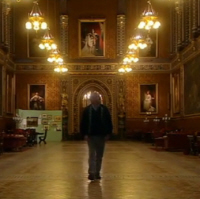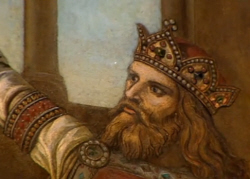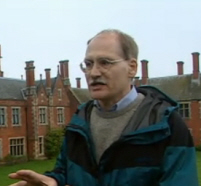British Identity
Heinrich Harke, Dr Sam Lucy
Britain AD: King Arthur’s Britain

Robing Room
Whether we hark back to Arthur or the Anglo-Saxons we Brits have always used history to create our national identity. The trouble is these that
identities based on a wholly imagined past so we end up not knowing who we really are. Go to the heart of our democracy and you see what I mean.
When the Victorians decided to decorate the Robing Room here in the House of Lords they chose to use the figure of King Arthur. The Victorians
had revived the Anglo-Saxon invasion myth with vigour. The invasion identified the noble English as descending from pure Teutonic stock as
distinct from the irrational undisciplined Celts.
In the paintings, King Arthur, a native British warrior from our Dark Age past, had to be made to fit the Anglo-Saxon virtues of the Victorian age. The
result was a ludicrous conflation of two very separate aspects of our national identity. British identity just wasn’t that simple.
Dr Sam Lucy “In the 19th century, at the same time that Anglo-Saxon archaeologists and historians are rewriting the history of the English, you
get, if you call them that, Celtic historians doing the same for the Welsh, Irish and Scottish, and it’s actually in direct opposition to each other.
They don’t happen in a vacuum. They are done in direct consequence of each other. You see very deliberate manipulation of historical sources and
archaeology try to create a sense of history.”

King Arthur

Dr Sam Lucy
The early centuries of Britain A.D. were formative years in the making of this country’s identity.
Heinrich Harke “It is not just the British who are being exercised by their early mediaeval past. It is the Germans, the French. It is right across
Europe. If we are now looking to find our roots – who are we, what is our identity – we almost invariably end up in the early middle ages, in the
immediate post-Roman period which removed a common culture and created little groups of smaller groups, smaller units to which we can look and
say ‘this is where I’m coming from’. Perhaps you will agree, in my view what the past is about is identity.”
Our ancestors were not brave Anglo-Saxon supermen, nor mysterious Celtic Warriors like Arthur. These origin myths, tying us to one pure race or
another, do not do justice to our culture.

Heinrich Harke
We were not a weak and disorganised society overpowered by the Romans. Nor did we dissolve into chaos when they left. We did not suffer a
period of dark age confusion and were never needed to be saved by the tribesmen of Anglo-Saxon legend. The real people of Britain A.D. did not
only survive an influx of foreign influences, but actually flourished because of them.
We absorbed Roman and later Byzantine and North European culture without losing a sense of our own identity. It is this ability to absorb and
adapt, this creative plagiarism, which has always been at the heart of British identity. And this diversity is not just a feature of our distant
past. It’s a trait that can still be seen in every aspect of our life.
Even our food. Robin Cook, former British Foreign Secretary, famously selected chicken tikka masala as Britain’s national dish.

Robin Cook, MP
Robin Cook “I believe that our national identity itself is a result of blending an enormous number of different inputs over centuries, of
different ethnic groups who have come here and settled here, were not so much absorbed as made their contribution and become part of the resultant
mix of our national identity. I think, actually, what makes Britain great, strong, is not purity, it is diversity. It’s all those different
influences that have shaped our language, history, culture and character.”

We Britons are striding into the 21st century with all the confidence of our Victorian ancestors. But in planning the way ahead we must keep an eye
on the past. If we discard our sense of history will be like people with no memory, who don’t know who they are. So to find the true origins of Britain
A.D. I’ve had to look beyond the headline grabbing figures – the Romans, King Arthur and the Anglo-Saxons. And instead I’ve turned to the real heroes
of these lands – the ordinary millions of Britons who invented our diverse and resilient culture.
One final thought. This could be Indian or China tea and it says on the packet it was grown in Kenya. Yet, despite, or maybe because of these
obvious foreign origins, this is still the best known symbol of Britain.





